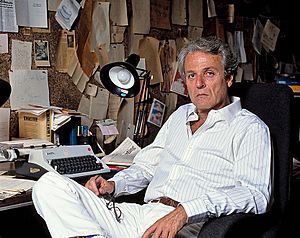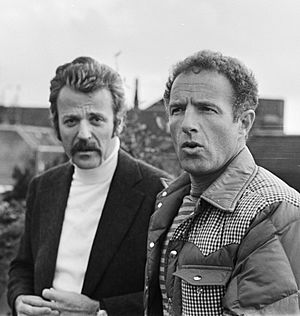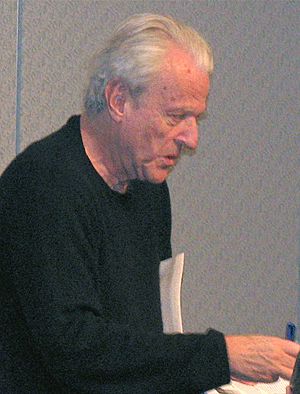William Goldman facts for kids
Quick facts for kids
William Goldman
|
|
|---|---|

Goldman in 1987
|
|
| Born | August 12, 1931 Chicago, Illinois, U.S. |
| Died | November 16, 2018 (aged 87) New York City, New York |
| Pen name | S. Morgenstern, Harry Longbaugh |
| Occupation |
|
| Education | Oberlin College (BA) Columbia University (MA) |
| Genre | Drama, fiction, literature, thriller |
| Spouse |
Ilene Jones
(m. 1961; div. 1991) |
| Children | 2 |
| Relatives | James Goldman (brother) |
William Goldman (born August 12, 1931 – died November 16, 2018) was a famous American writer. He wrote novels, plays, and movie scripts. He first became known as a novelist in the 1950s. Later, he became very successful writing for movies.
He won two Academy Awards (also known as Oscars) for his movie scripts. These were for Butch Cassidy and the Sundance Kid (1969) and All the President's Men (1976). His other popular works include the exciting novel Marathon Man (1974). He also wrote the beloved fantasy-comedy novel The Princess Bride (1973). He later helped turn both of these books into movies.
Contents
Early Life and Education
Goldman was born into a Jewish family in Chicago in 1931. He grew up in a suburb called Highland Park, Illinois. His father was a successful businessman who died when William was in high school. His mother was deaf, which added challenges at home.
College and Military Service
Goldman earned a Bachelor of Arts degree from Oberlin College in Ohio in 1952. The Korean War was happening, so he joined the Army. Because he could type, he worked as a clerk at the Pentagon, which is the headquarters for the U.S. military. He left the Army in 1954.
After the Army, he went to Columbia University using the GI Bill. He earned a Master of Arts degree in 1956. During this time, he wrote short stories in the evenings. However, it was hard for him to get them published.
Writing Career
Goldman started writing when he took a creative writing class in college. He said his grades in that class were "horrible." He was an editor for his college's literary magazine. At first, he wanted to write poetry, short stories, and novels, not movie scripts.
His older brother, James Goldman, was also a writer. They lived together in New York with their friend John Kander. John Kander became a famous composer for musicals like Cabaret and Chicago. All three of them eventually won Academy Awards.
Becoming a Novelist
In 1956, William Goldman started writing his first novel, The Temple of Gold. He finished it in less than three weeks! A literary agent agreed to represent him. The book was published and sold well enough to start his writing career.
He quickly wrote his second novel, Your Turn to Curtsy, My Turn to Bow (1958). Then came Soldier in the Rain (1960), which was based on his time in the military. This book also sold well and was made into a movie, though Goldman did not write the movie script.
Writing for Theater
William and his brother James worked together on some plays. They helped rewrite a musical called Tenderloin (1960). They also wrote their own play, Blood, Sweat and Stanley Poole (1961). With John Kander, they wrote the musical A Family Affair (1962). Both plays had short runs.
Goldman later had trouble writing a novel called Boys and Girls Together. He had "writer's block." But he got an idea for a new novel, No Way to Treat a Lady (1964). He wrote it in just two weeks! He published it using the fake name Harry Longbaugh. After that, he finished Boys and Girls Together, which became a best-seller.
Becoming a Screenwriter
Actor Cliff Robertson read an early version of No Way to Treat a Lady. He hired Goldman to write a movie script for a story called Flowers for Algernon. Before that script was even done, Robertson also asked Goldman to help rewrite a spy movie called Masquerade (1965).
Later, a producer named Elliot Kastner asked Goldman to adapt a detective novel. Goldman chose The Moving Target. The movie, starring Paul Newman, was called Harper (1966) and became a big hit.
Butch Cassidy and the Sundance Kid
Goldman then wrote The Thing of It Is... (1967), another novel. He taught at Princeton and wanted to write something new. He couldn't think of a novel idea, so he wrote his first original movie script instead. This was Butch Cassidy and the Sundance Kid. He had been researching the real story for eight years!
He sold the script for $400,000, which was the highest price ever paid for an original script at that time. The movie came out in 1969 and was very successful. Goldman won an Academy Award for Best Original Screenplay for it. This money allowed him to take time off and write a non-fiction book about Broadway.
The Princess Bride and Other Hits
Goldman's next novel was The Princess Bride (1973). He also wrote a movie script for it, but it took more than ten years for the movie to be made. Around this time, he got very sick, which made him write even more creatively.
After his editor died in 1973, Goldman started writing more commercial books. He wrote a children's book called Wigger (1974). Then came the thrilling novel Marathon Man (1974). He sold the movie rights for this book for $450,000.
His next thriller was Magic (1976). He wrote the movie scripts for Marathon Man (1976) and Magic (1978). He also wrote the script for The Stepford Wives (1975). He worked with director George Roy Hill and actor Robert Redford again on The Great Waldo Pepper (1975).
All the President's Men
Robert Redford hired Goldman to write the script for All the President's Men (1976). This movie was about the Watergate scandal. Goldman wrote the famous line "Follow the money" for the movie.
Goldman later said he was not happy with how the movie turned out. Some people thought he was pressured to add a romantic story to the film. He said he wrote many versions of the script for that movie. Despite his feelings, the movie won him an Academy Award for Best Adapted Screenplay.
There was some debate about who truly wrote the script for All the President's Men. However, a magazine called Written By investigated and concluded that Goldman was the only writer of the screenplay.
Later Career and Success
Goldman had a better experience writing A Bridge Too Far (1977). This movie was based on a book about a famous battle. He even wrote a book about making the movie.
After some of his movie scripts weren't filmed, Goldman became less busy as a screenwriter. He then published a book about his experiences in Hollywood called Adventures in the Screen Trade (1983). In this book, he famously wrote, "Nobody knows anything," about how unpredictable the movie business is.
He focused on writing more novels during this time, including Control (1982) and The Silent Gondoliers (1983). His last published novel was Brothers (1986), a sequel to Marathon Man.
Return to Hollywood
Goldman's career in Hollywood picked up again. He wrote the scripts for the movie versions of his own books, Heat (1986) and The Princess Bride (1987).
The Princess Bride movie was directed by Rob Reiner. Reiner then hired Goldman to write the script for the 1990 movie Misery, based on a book by Stephen King. This movie was very successful, and the actress Kathy Bates won an Academy Award for her role.
Goldman also became known as a "script doctor." This means he would secretly help rewrite movie scripts without getting credit. He worked on many popular films like A Few Good Men (1992) and Last Action Hero (1993).
He received credit for other movies, including Maverick (1994), a popular hit. He also wrote The Ghost and the Darkness (1996), an original story based on true events. Other credited works include Absolute Power (1997) and The General's Daughter (1999).
Later Works
Goldman wrote another book about his Hollywood experiences, Which Lie Did I Tell? (2000). He also published a collection of his essays called The Big Picture: Who Killed Hollywood? and Other Essays (2001).
His later movie scripts include Hearts in Atlantis (2001) and Dreamcatcher (2003). Both were based on novels by Stephen King. He also adapted Misery into a stage play, which opened on Broadway in 2015.
His script for Heat was filmed again as Wild Card (2015).
His Own Thoughts on His Work
Goldman once said about his writing: "I don't like my writing. I wrote a movie called Butch Cassidy and the Sundance Kid and I wrote a novel called The Princess Bride and those are the only two things I've ever written, not that I'm proud of, but that I can look at without humiliation."
Awards and Recognition
William Goldman won two Academy Awards:
- Academy Award for Best Original Screenplay for Butch Cassidy and the Sundance Kid
- Academy Award for Best Adapted Screenplay for All the President's Men
He also won two Edgar Awards from the Mystery Writers of America. These were for Best Motion Picture Screenplay for Harper (1967) and Magic (1979). In 1985, he received the Laurel Award for Screenwriting Achievement from the Writers Guild of America.
Personal Life
William Goldman was married to Ilene Jones from 1961 until their divorce in 1991. They had two daughters, Jenny and Susanna. Ilene was a model.
Goldman said his favorite writers included Miguel de Cervantes, Anton Chekhov, and Leo Tolstoy. He was a big fan of the New York Knicks basketball team. He had season tickets for over 40 years.
Death
William Goldman passed away in Manhattan on November 16, 2018. He died from complications related to colon cancer and pneumonia.
Works
Theater Plays
Produced Plays
- Tenderloin (1960) – he helped rewrite it without credit
- Blood, Sweat and Stanley Poole (1961) – with his brother James Goldman
- A Family Affair (1962) – he wrote the song lyrics
- Misery (2012) – adapted from the novel Misery
Movie Screenplays
Produced Screenplays
| Year | Title | Director | Notes |
|---|---|---|---|
| 1965 | Masquerade | Basil Dearden | |
| 1966 | Harper | Jack Smight | |
| 1969 | Butch Cassidy and the Sundance Kid | George Roy Hill | Won Academy Award for Best Original Screenplay |
| 1972 | The Hot Rock | Peter Yates | |
| 1975 | The Stepford Wives | Bryan Forbes | |
| The Great Waldo Pepper | George Roy Hill | ||
| 1976 | Marathon Man | John Schlesinger | Based on his own novel |
| All the President's Men | Alan J. Pakula | Won Academy Award for Best Adapted Screenplay | |
| 1977 | A Bridge Too Far | Richard Attenborough | |
| 1978 | Magic | Based on his own novel | |
| 1986 | Heat | Dick Richards Jerry Jameson |
Based on his own novel |
| 1987 | The Princess Bride | Rob Reiner | Based on his own novel |
| 1990 | Misery | ||
| 1992 | Memoirs of an Invisible Man | John Carpenter | |
| Year of the Comet | Peter Yates | ||
| Chaplin | Richard Attenborough | ||
| 1994 | Maverick | Richard Donner | |
| 1996 | The Chamber | James Foley | |
| The Ghost and the Darkness | Stephen Hopkins | ||
| 1997 | Absolute Power | Clint Eastwood | |
| 1999 | The General's Daughter | Simon West | |
| 2001 | Hearts in Atlantis | Scott Hicks | |
| 2003 | Dreamcatcher | Lawrence Kasdan | |
| 2015 | Wild Card | Simon West | Based on his own novel |
Movie Script Consultant
- A Few Good Men (1992)
- Malice (1993)
- Dolores Claiborne (1995)
- Extreme Measures (1996)
- Good Will Hunting (1997)
Uncredited Script Work
- Twins (1988)
- Last Action Hero (1993)
- Fierce Creatures (1997)
Novels
The Thing of It Is series:
- The Thing of It Is... (1967)
- Father's Day (1971)
Babe Levy series:
- Marathon Man (1974)
- Brothers (1986)
Stand-alone Novels:
- The Temple of Gold (1957)
- Your Turn to Curtsy, My Turn to Bow (1958)
- Soldier in the Rain (1960)
- Boys and Girls Together (1964)
- No Way to Treat a Lady (1964)
- The Princess Bride (1973)
- Magic (1976)
- Tinsel (1979)
- Control (1982)
- The Silent Gondoliers (1983)
- The Color of Light (1984)
- Heat (1985)
Children's Books
- Wigger (1974)
- This story is about an orphan named Wigger. She almost dies of loneliness when she is separated from her special blanket. But then, a magical wind brings them back together.
Non-fiction Books
- The Season: A Candid Look at Broadway (1969) – about Broadway theater
- The Story of 'A Bridge Too Far' (1977) – about making the movie
- Adventures in the Screen Trade series:
- Adventures in the Screen Trade: A Personal View of Hollywood and Screenwriting (1983)
- Which Lie Did I Tell?: More Adventures in the Screen Trade (2000)
- Wait Till Next Year (1988) – a memoir about sports, with Mike Lupica
- Hype and Glory (1990) – a memoir about being a judge at the Cannes Film Festival and Miss America Pageant
- The Big Picture: Who Killed Hollywood? and Other Essays (2001) – a collection of essays
Adaptations of His Works
- Soldier in the Rain (1963) – movie based on his novel
- No Way to Treat a Lady (1968) – movie based on his novel
- Marathon Man (1976) – movie based on his novel
- Magic (1978) – movie based on his novel
- Heat (1986) – movie based on his novel
- The Princess Bride (1987) – movie based on his novel
- Wild Card (2015) – movie based on his novel Heat
See also
 In Spanish: William Goldman para niños
In Spanish: William Goldman para niños
 | Precious Adams |
 | Lauren Anderson |
 | Janet Collins |



